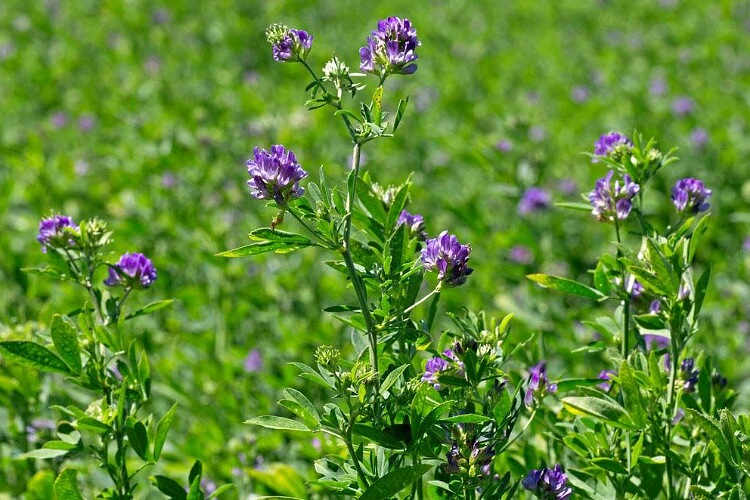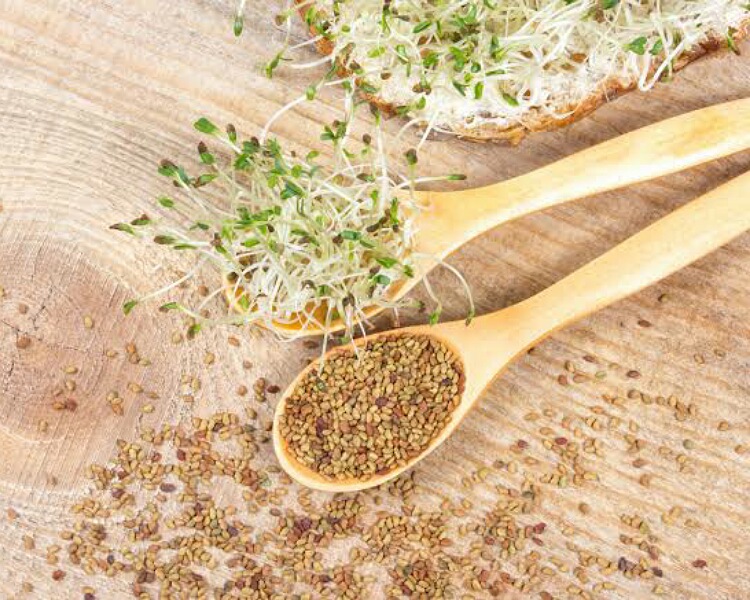Alfalfa is a plant used to feed livestock. It has higher amounts of protein, minerals and vitamins than the other livestock feeds. But humans too consume it as a food or medicine in form of leaves and alfalfa sprouts. What are its health benefits? Any safety concerns? How can one consume it?
Alfalfa
Alfalfa is a legume plant that is considered a herb. It is an ancient crop and its other names are lucerne or Medicago sativa. For many centuries, globally people are growing it to feed their livestock. It is superior to other feeds due to its higher content of vitamins, minerals and protein.
Even humans consume it as a medicine and food. Its leaves and seeds are edible. And the seeds can be sprouted and used in herbal preparation of medicines.

But it can cause safety issues. The plant parts can harbor germs of E.coli, listeria and salmonella. Also, they can interfere with blood thinning drugs. Moreover, they might lead to flare-ups in autoimmune conditions such as lupus. The sprouts could be infected and lead to severe infections in immunocompromised host.
Nutrients of alfalfa and alfalfa sprouts
Humans consume it less as food and more as a herbal supplement. The leaves and seeds have medicinal properties.
100 g of alfalfa sprouts, as per USDA data, has 23 calories. It has no cholesterol and fat content is 0.7 g. Of this, saturated fats are 0.1 g. Total carbs are 2.1 g and sugars are 0.2 g. The dietary fiber is 1.9 g. Proteins are high at 4 g. Potassium is 79 mg while sodium is low at 6 mg.
Additionally, they have vitamin C, vitamin K, calcium, iron and magnesium. Moreover, it has copper, manganese and folate. There is some thiamine, riboflavin, as well in them.

It is a rich source of antioxidants. These include highly bioactive plant compounds such as saponins, flavonoids, coumarins, phytosterols, phytoestrogens, as well as alkaloids.
Health benefits
Reduction of blood bad cholesterol
Multiple detailed studies have shown that this plant can lower the triglycerides and bad cholesterol in blood. And at the same time, it increases the blood good cholesterol level. This decreases heart disease risk. This cholesterol reduction is due to the saponins present in it. Most studies are done in animals.
Lowering of blood pressure
It has substances that can help reduce the blood pressure readings. This is useful for patients of high blood pressure.
Diuretic
This can act medicinally to increase urine output. This would be useful in certain diseases related to the cardiovascular system.
Improving lactation
It has the potential to increase milk production and output. Thus it is a good galactagogue.
Arthritis relief
Traditional healers use this in management of cases of arthritis.
Kidney stones management

It finds use in getting rid of renal stones. But human research on it is lacking.
Anti-diabetic
The leaves and sprouts can control blood sugar. But this is extrapolated from animal studies. One needs to do human studies before prescribing it as a medicinal food in diabetics.
Also, read Pros and cons of Galveston diet for peri-menopausal problems!
Relief of menopausal symptoms
Alfalfa has phytoestrogenic substances and these assist in relief of menopausal symptoms that occur due to estrogen withdrawal. There is some evidence that it reduces hot flushes. But extensive research in it is lacking.
